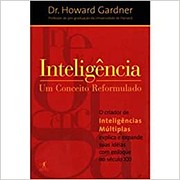

Clique em uma foto para ir ao Google Livros
|
Carregando... Inteligência: Um Conceito Reformulado (edição: 2000)de Howard GARDNER (Autor)
Informações da ObraIntelligence Reframed: Multiple Intelligences for the 21st Century de Howard Gardner
 Nenhum(a) Ainda não há conversas na Discussão sobre este livro. This is --- unfortunately --- not really a book about Gardner's theory of multiple intelligences (TIM), it's actually about Gardner's love of his own theorizing. I chose the book from our library (thank God I didn't buy it) because I wanted to learn more about his TIM. I have to say, I don't think the theory is that bad: it actually makes a lot of sense to think about intelligence in ways other than traditional psychometric approaches. However, only the 2nd and 3rd chapters are actually something like an introduction to TIM, afterwards it gets very repetitious, speculative and narcisstic (talk about intrapersonal intelligence, huh?). There's a lot of talk about empirical underpinnings, but just talk --- there aren't any references; instead, we get to here what the great Gardner muses about this and that, including spirituality, wisdom and leadership (I'm not kidding). Maybe this is what happens when a once-scientist is overtaken by a huge commercial success. Taken together, I seriously discourage reading this book; maybe the first book ("Frames of mind") is better, and, if you want to stick to popular science, you should probably choose something written by a professional writer instead of by Gardner himself. sem resenhas | adicionar uma resenha
A brilliant state-of-the-art report on how the landmark theory of multiple intelligences is radically changing our understanding of education and human development. Não foram encontradas descrições de bibliotecas. |
Current DiscussionsNenhum(a)Capas populares
 Google Books — Carregando... Google Books — Carregando...GênerosClassificação decimal de Dewey (CDD)153.9Philosophy and Psychology Psychology Cognition And Memory Assessment And IntelligenceClassificação da Biblioteca do Congresso dos E.U.A. (LCC)AvaliaçãoMédia: (3.72) (3.72)
É você?Torne-se um autor do LibraryThing. |
||||||||||||||||||||||||||||||||||||||||||||||||||||||||||||||||||||||||||||||||||||||||||||||||||||||||||||||||||||||||||||||||||||||
"But wisdom is not a predictable feature of aging; many old people do not show particular range in reaching their judgements, and certainly some young people are wise beyond their years. The historian George Kennan and the philosopher Isaiah Berlin did not suddenly become wise when they entered their eighth or ninth decade, and fortunately for them and us, their skill at synthesizing did not decline noticeably with age." (Page 133)
"A crucial point about wisdom is its modesty, its humility. Neither intelligence nor creativity nor leadership reserveds a place for silence, for quite, for resignation. ... The wise person knows when to say nothing, and when to step down and make room for someone else. The wise adult knows about the fraility of humanity and the difficulty of bringing about enduring changes." (Page 134)
"When someone hears or observes the responses of others, particularly those at a higher stage, their own thinking may become more complex and rich." (Page 189) This reminded me of [b:Flow|66354|Flow|Mihaly Csikszentmihalyi|http://photo.goodreads.com/books/1170649609s/66354.jpg|64339] which emphasizes the importance of increasing levels of complexity for happiness.
And why is the author so modest about forcing his views on us: "Unfortunately, we don't know a lot about the personal intelligences." (Page 201) Ultimately, we all have a lot to learn, and this book emphasizes that the quick application of Multiple Intelligence theory is liable to be a misapplication. Gardner advocates avoiding simplistic application of what we only vaguely understand, and striving for a deeper understanding. (